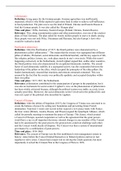Lebensraum:
Definition: living space for the German people. German agriculture was inefficiently
organized, which is why Hitler aspired to gain more land in order to achieve self-sufficiency
in food production. The plan was to use the land of Poland, Ukraine and Eastern Russia to
feed the German people. It was also called the ‘Hunger plan’.
Time and place: 1920s, Germany, Eastern Europe (Poland, Ukraine, Eastern Russia)
Relevance: This, along extermination camos and other monstrosities, was one of the cruelest
plans of Nazi Germany. The plan called for twenty million people to starve to death- among
these people were not only Poles, Ukrainians and Russians, but also Europe’s Jews who
would be worked to death.
Pacification democracy:
Definition: After the Pacification of 1917, the Dutch politics were characterized by a
phenomenon called ‘pillarization.’’ This meant that the society was segregated into different
pillars (Catholic, Protestant, social democratic and liberal/neutral), and the key aspects of life,
like religion, politics, leisure, etc., took place merely in one’s own circle. While this wasn’t
happening exclusively in the Netherlands, Arend Lijphart argued that, unlike other countries,
the Dutch politics were also characterized by exceptional democratic stability. The crucial
factor of such democratic stability in a segregated society was the cooperation between the
leadership of the pillars or the elites, which accepted the principles of the other pillars. the
leaders harmoniously ensured that emotions and tensions remained contained. This was
ensured by the fact that the society was politically apathetic and accepted discipline within
their own pillar.
Time and place: 1917-1967, the Netherlands
Relevance: pillarization contributed to the emancipation of groups in the population, but it
was also an instrument for social control. Lijphart’s view on the phenomenon of pillarization
has been widely criticized because, although the political system was stable, as a rule it was
actually powerless. Moreover, the social democrats weren’t involved in the political life, and
were not a part of the political elite described by Lijphart.
Concert of Europe:
Definition: After the defeat of Napoleon (1815), the Congress of Vienna was convened to re-
create the balance of power by setting new boundaries and preventing future French
domination. Napoleon’s return and second defeat required a new peace treaty with France:
the four victors (Britain, Austria, Russia, and Prussia) signed the Quadruple Alliance, which
called for periodic meetings to maintain the peace of Europe. This clause, which created
a Concert of Europe, assured cooperation as well as the agreement that the great powers
would have a say on all important decisions; internal changes in any member of the Concert
had to be sanctioned by the great powers; the great powers could not challenge each other;
and the Concert would decide all disputes. The Concert was thus a system of international
governance by a combination of great powers.
Time and place: 1814-1860
Relevance: The concert of Europe was the first multilateral crisis management system in
history: states before the Concert limited themselves to bilateral policies and never met
together to solve crises. Concert had a major role in solving the Greek question, but most
importantly it solved the Crimean War at the Congress of Paris in 1856.
,Realpolitik
1. During the 19th century, romantic ideas were replaced by an emphasis on
materialism, holding that everything spiritual or ideal was an outgrowth of
physical forces. In politics the new emphasis on realism came to be known by the
German term Realpolitik (politics of reality). The term was originated in 1853 by
A. L. Rochau, who called for a strong German national-liberal state able to defend
itself from Napoleon.
In domestic affairs Realpolitik meant that people needed to content themselves
with an honest, hard-working government. For radicals it meant that people
should stop believing that the new society would result from goodness or justice
and that social reformers must use power and calculation. In international affairs
Realpolitik meant that governments should not be guided by any ideology, but
that they should follow their own practical or strategic interests, making alliances
that seemed useful and disregarding ethical in order to achieve their goals.
2. The most famous practitioner of Realpolitik was the German chancellor Bismarck
who used the politics of reality to achieve the creation of a unified German nation-
state in 1871.
Schlieffen Plan:
Definition: It was a battle plan first proposed in 1905 by the German general Schlieffen,
which was supposed to allow Germany to win a two-front war. The plan, however, was
changed by Moltke before World War I.
Time and place: 1914
Relevance: After Germany’s defeat in 1918, the German military blamed the plan as the
cause of their defeat, while the allies considered the plan to be a manifestation of German
aggression against neutral countries.
Treaty of Brest-Litovsk:
Definition: On December 3rd, 1917, there was a peace conference between the Bolshevik
government of the Soviet Union and the Central Powers (Germany, Austria-Hungary,
Bulgaria, the Ottoman Empire). They signed a treaty which ended Russia’s participation in
World War I. The Bolshevik government was sabotaged to sign the treaty by the threat of
further advances by German forces.
Time and place: March 3, 1918, Brest-Litovsk
Relevance: In the treaty, Russia not only ceded the Baltic States and other territories to
Germany, but also agreed to pay a huge amount of German gold marks in reparations. The
treaty marked the end of the Entente (Russia, France, Great Britain), which was the greatest
German success during the whole war. The German army could finally move from east to
west where they prepared to launch the final attack on France to end the war.
February Revolution:
Definition: During World War I, Russia experienced multiple defeats, which is why the Tsar
took over the command of army. However, it did not lead to good results, and he was blamed
for every defeat. The situation was made worse by the German-born Tsarina Alexandra and
her friendly relationship with Rasputin. All this eventually led the Russian population to lose
faith in the Tsarist regime. The February revolution was the first of two revolutions that
happened in Russia during 1917. It took place on the International Women’s Day, when
metal workers in Petrograd together with female protesters protested against food rationing.
, The situation escalated as more protesters joined asking for the abdication of the Tsar and an
end to the war. Troops in the city refused to suppress the riot and joined the protesters.
Time and place: 8-16 March 1917 (Gregorian calendar), Russia
Relevance: the result of the revolution was the abdication of the Tsar and the consequent end
of the autocratic rule in Russia (Tsar’s brother refused to succeed the throne). The fall of
tsarism made a great impression as democrats and progressives came forward even in Russia.
League of Nations:
Definition: At the end of World War One, Wilson insisted that a new type of treaty must be
stipulated, since the old diplomacy had led to war. Thus, 27 nations assembled in Paris, even
though the decisions were made by the ‘’Big Four’’ (Wilson, Lloyd George, Clemenceau,
Orlando). The President of the US, W. Wilson insisted that the main objective should be the
creation of a League of Nations capable maintaining peace and stability. Within a few days,
under the leadership of Wilson, the conference prepared the Covenant of the League of
Nations, which contained 26 articles. They established constitutional basis of the new system,
demanded open diplomacy, collective security, the creation of an international court,
international cooperation in economic affairs, etc.
Time and place: January 10, 1920,
Relevance: Although the League did not leave everyone satisfied, its creation was very
important in the history of international relations. It was the guide for all the activities of the
members of the League, and also the basis of the conduct and governments of many
developed countries.
Viet Nam Quoc Dan Dang (VNQDD)
Definition: The Vietnamese Nationalist Party was the first revolutionary nationalist party in
Vietnam. It was inspired by the Nationalist Party in China, and its members were anticolonial
activists. The main aim was to establish a democratic government in French Indochina
without foreign influence.
Time and place: 1927- 1975, Vietnam
Relevance: As the party was joined by military officers, it started terrorist activities against
the French, who refused to give the Vietnamese the right to participate in the electoral
process. The campaign included targeted assassinations of French officials, to which the
French responded with executing or imprisoning the leaders of the Party.
The Great depression
Definition: During the ‘roaring twenties’ the US economy had expanded massively. The
European system was involved in a global system of trade and production based on the
principles of supply and demand. The system rested upon the trust that lenders, creditors and
investors could get their money back, and that those who borrowed would pay their debts.
However, there were some major problems, such as global agricultural distress, which made
the Great Depression worse. The depression began as a stock market and financial crisis,
which passed form finance to industry and from the US to the whole world. The export of
American capital ended, businesses and private people could not get their money back from
banks, etc.
Time and place: October 1929- 1939
Relevance: During the years of depression consumer spending and investing declined,
causing declines in industrial output and employment. In 1932, there were about 30 million
unemployed persons in the world. There was the development of sidewalk art, charity, doles
and relief. One of the biggest economic consequences of the Great Depression was a strong






